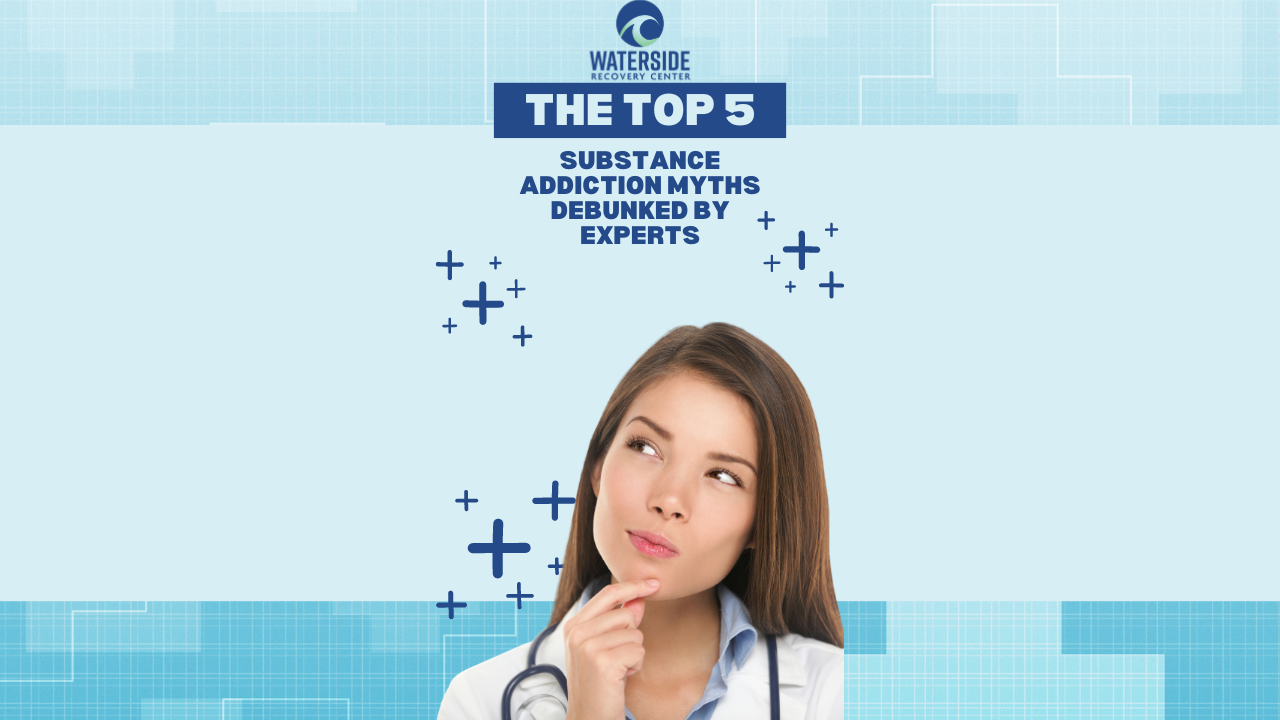Unveiling Addiction Myths: Evidence-Based Debunking of the Top 5 Misconceptions
Breaking down the barriers of misinformation is crucial in addressing addiction and promoting a compassionate understanding of this complex issue. In this blog post, we will systematically debunk some of the top myths surrounding addiction, supported by evidence and research. Avoid these five addiction myths busted by experts.
Myth: Addiction is a Moral Failing
This is a harmful misunderstanding of addiction. Viewing addiction as a moral failing perpetuates harmful stigma, hindering individuals from seeking the necessary help and support. This misconception not only hinders individuals from seeking addiction treatment but is also fundamentally untrue.
Evidence: The American Society of Addiction Medicine (ASAM) defines addiction as a chronic medical disease, emphasizing its complex nature with genetic, environmental, and neurobiological factors. Research published in the Journal of Neuroscience highlights the impact of addiction on brain circuitry, reinforcing the medical perspective and challenging the notion of moral failure (ASAM, Journal of Neuroscience).
Myth: Only “Hard” Drugs Can Lead to Addiction
The misconception that only “hard” drugs lead to addiction is misleading and oversimplified. In reality, misuse of various substances, including prescription medications and alcohol, can also result in significant and challenging addiction. Moreover, the societal acceptance of certain substances, like alcohol, may prolong an individual’s abuse of that substance without timely intervention, assistance, or treatment.
Evidence: The National Institute on Drug Abuse (NIDA) emphasizes that addiction is not limited to illicit substances. Misuse of prescription medications, alcohol, and other legal substances can also lead to addiction. Research from NIDA reveals the neurobiological mechanisms that underlie addiction, irrespective of the substance involved (NIDA, NIDA Research Report).
Myth: People with Addiction Lack Willpower to Quit
Addiction is not a matter of having or not having enough willpower. The myth that individuals with addiction lack willpower in incorrect. It overlooks the reality that addiction alters the brain’s chemistry, making it challenging to quit without professional help. Recognizing this fact is crucial, as it shifts the focus towards evidence-based treatments that address both the physical and psychological aspects of addiction, providing valuable support on the journey to recovery.
Evidence: The National Institute on Alcohol Abuse and Alcoholism (NIAAA) highlights the role of genetic and environmental factors in addiction, contributing to changes in the brain’s reward circuitry. The Chronic Care Model for Addiction Treatment supports the understanding that addiction is a chronic disease requiring comprehensive, ongoing care (NIAAA, Chronic Care Model).
Myth: Treatment is Only Effective if the Person Hits “Rock Bottom”
This myth is dangerous. Recovery can begin at any point in someone’s struggle with substance abuse. Acting early is important. Waiting too long may lead to irreversible consequences and prolonged suffering. It’s crucial to act promptly and offer support.
Evidence: The Substance Abuse and Mental Health Services Administration (SAMHSA) stresses the importance of early intervention and treatment initiation. Research published in JAMA Psychiatry demonstrates the efficacy of early intervention in improving treatment outcomes, challenging the notion that one must reach rock bottom for treatment to be effective (SAMHSA, JAMA Psychiatry).
Myth: Once in Recovery, the Battle is Won
Recovery is an ongoing journey. The idea that the battle is won once someone enters recovery is not accurate. Sustaining recovery requires ongoing commitment, support, and the development of coping strategies. Long-term success involves actively engaging in aftercare programs, support groups, and maintaining a strong social network. Recognizing that recovery is a continuous process helps individuals stay vigilant and resilient in the face of challenges, fostering a lasting and meaningful journey toward a healthier life.
Evidence: The National Institute on Drug Abuse (NIDA) emphasizes the chronic nature of addiction, highlighting the potential for relapse even after successful treatment. Long-term recovery requires ongoing support, as outlined in the Principles of Effective Treatment published by NIDA (NIDA Principles, NIDA).
Substance Abuse Addiction Is Commonly Misunderstood.
By debunking these myths with evidence-based information, we aim to contribute to a more accurate and compassionate understanding of addiction. Recognizing addiction as a medical condition and dispelling misconceptions can help reduce stigma and encourage individuals to seek timely, effective treatment.
At Waterside Recovery Centers we pride ourselves on providing the top addiction treatment in Massachusetts. With a range of evidence-based, client-focused and individualized treatment offerings, we are able to provide the ideal support for those seeking recovery from substance addiction. Please feel free to reach out to our help line at anytime.
(866)671-8620


